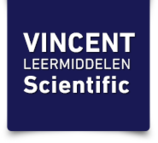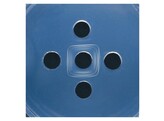Antigen-Antibody Interaction: The Ouchterlony Procedure
Introduce your students to the principles of antigen-antibody interactions by using the Ouchterlony procedure. Antibodies and antigens form complexes that precipitate, making it possible to assay antibody-antigen systems. The binding interaction results in the formation of a white precipitate after diffusion in agarose.
• Explore antigen-antibody interactions using a classic immunological technique
• Set up Ouchterlony double diffusion plates and observe different precipitation reactions
• Understand the biology behind equivalence zones
• Recognize the patterns created by different reactions (identity, partial identity, non-identity)
For 10 sets of reactions
Time Required:
Set Up - 35 minutes / Incubation - overnight
Kit Includes:
Instructions, animal serum antigens & antibodies, practice gel loading solution, agarose, powdered buffer, transfer pipets, petri plates, well cutters, microtest tubes.
All You Need:
Automatic micropipettes with tips, 5 or 10 ml pipets, 55ºC water bath, measuring spatulas or toothpicks, microwave or hot plate, distilled water, incubation oven (optional).
Storage:
Some Components Require Refrigerator Storage
Introduce your students to the principles of antigen-antibody interactions by using the Ouchterlony procedure. Antibodies and antigens form complexes that precipitate, making it possible to assay antibody-antigen systems. The binding interaction results in the formation of a white precipitate after diffusion in agarose.
• Explore antigen-antibody interactions using a classic immunological technique
• Set up Ouchterlony double diffusion plates and observe different precipitation reactions
• Understand the biology behind equivalence zones
• Recognize the patterns created by different reactions (identity, partial identity, non-identity)
For 10 sets of reactions
Time Required:
Set Up - 35 minutes / Incubation - overnight
Kit Includes:
Instructions, animal serum antigens & antibodies, practice gel loading solution, agarose, powdered buffer, transfer pipets, petri plates, well cutters, microtest tubes.
All You Need:
Automatic micropipettes with tips, 5 or 10 ml pipets, 55ºC water bath, measuring spatulas or toothpicks, microwave or hot plate, distilled water, incubation oven (optional).
Storage:
Some Components Require Refrigerator Storage
Properties
- 270/EDVO
- 270

